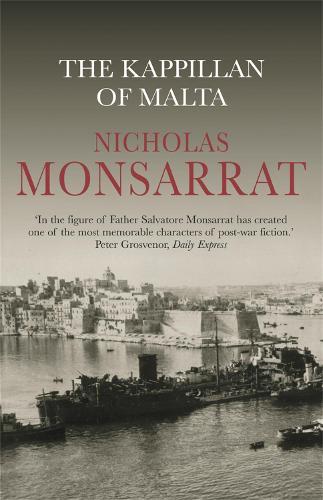Full Product Details
Author: Nicholas Monsarrat
Publisher: Orion Publishing Co
Imprint: Cassell Military
Dimensions:
Width: 13.00cm
, Height: 3.40cm
, Length: 19.60cm
Weight: 0.400kg
ISBN: 9780304358441
ISBN 10: 0304358444
Pages: 464
Publication Date: 08 March 2001
Audience:
General/trade
,
General
Format: Paperback
Publisher's Status: Active
Availability: Available To Order

We have confirmation that this item is in stock with the supplier. It will be ordered in for you and dispatched immediately.
Reviews
It's difficult to make good, fictional priests attractive or even believable. The characters who seem to engage us most are the problem priests, cf. Graham Greene, Brian Moore. That this is so may have as much to do with the quality of the writing as with the construction of the character. At any rate, Monsarrat's novel arrives with raves from English reviewers with regard to his creation of Father Salvatore, or Dun Salv, as his devoted parishioners call him. The story is set during the siege of the British possession of Malta from June, 1940 until August, 1942. Father Salvatore, the kappillan (Maltese for priest) is the descendant of an ancient Maltese family. His mother, the Baroness Celeste Santo-Nobile reigns in aristocratic splendor despite the perils surrounding them. His brother, Benedict, lives in sophisticated style in Paris where he now entertains the Germans. Lewis, his brother-in-law, is an Italian sympathizer whose allegiance will land him in prison before the war is over. But Fr. Salvatore chooses to remain a priest without preferment and to this end he quotes St. Jerome: Avoid, as you would the plague, a priest who is also a man of business. When his church is bombed he establishes his congregation in the catacombs which now serve as a 24 hour air-raid shelter. During the course of the war Fr. Salvatore is removed by his superiors because of the conduct of his flock in the primitive conditions of the caves and because his own role has grown too exalted. At first he rebels against the discipline but finally accepts the chastisement and spends the following 30 years in seclusion at a nearby monastery. To his people he remains a hero. The structure of Monsarrat's novel is masterly - many subplots being carefully interwoven. But what really holds the reader's attention and admiration is the story of Malta itself which has been conquered many times in its long history. The problems and character of Father Salvatore, however, are not sufficiently complex to truly absorb us. (Kirkus Reviews)
Author Information
Nicholas Monsarrat was born in Liverpool in 1910, and was educated at Trinity College, Cambridge. He served in World War II, first as a member of an ambulance brigade and then as a member of the Royal Naval Volunteer Reserve. His lifelong love of sailing made him a capable naval officer, and he served with distinction on a series of small warships. Resigning his wartime commission in 1946, Monsarrat entered the diplomatic service. He turned to writing full time in 1959, settling on the Mediterranean island of Gozo. He died of cancer in 1979 and was buried at sea from a destroyer, off Portsmouth.




